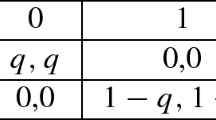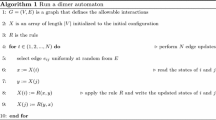Abstract
We propose a simple model of society with a symmetric functionw(u, v) measuring the influence of the opinion of memberv on that of memberu. The opinions are chosen from a finite set. At each step everyone accepts the majority opinion (with respect tow) of the other members. The behaviour of such a society is clearly periodic after some initial time. We prove that the length of the period is either one or two.
Similar content being viewed by others
References
J. R. P. French, A Formal Theory of Social Power,Psych. Review 63 (1956), 181–194.
F. Harary, A Criterion for Unanimity in French’s Theory of Social Power, in:Research, Ann Arbor, Michigan, (1959), 168–182.
F. S. Roberts,Discrete Mathematical Models, with Application to Social, Biological, and Environmental Problems, Prentice-Hall, Englewood Cliffs, N. J. 1976.
Author information
Authors and Affiliations
Rights and permissions
About this article
Cite this article
Poljak, S., Sůra, M. On periodical behaviour in societies with symmetric influences. Combinatorica 3, 119–121 (1983). https://doi.org/10.1007/BF02579347
Received:
Issue Date:
DOI: https://doi.org/10.1007/BF02579347




